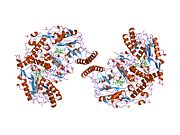Nitric oxide synthase, inducible is an enzyme which is encoded by the NOS2 gene in humans and mice.[5]
Genetics
Three related pseudogenes are located within the Smith-Magenis syndrome region on chromosome 17. Alternative splicing of this gene results in two transcript variants encoding different isoforms.[6]
Location
Nitric oxide synthase is expressed in epithelial cells of the liver, lung and bone marrow. It is inducible by a combination of lipopolysaccharide and certain cytokines.[citation needed]
Function
Nitric oxide is a reactive free radical mediating in neurotransmission, antimicrobial and antitumoral activities.[citation needed] In mice, the function of Nos2 in immunity against a number of viruses, bacteria, fungi, and parasites has been well characterized, whereas in humans the role of NOS2 has remained elusive and controversial.[7] Nos2 is important for protective immunity against CMV.[8]
Caveolin 1 has been shown to interact with Nitric oxide synthase 2A.[9] and Rac2.[10]
Deficiency
Autosomal recessive NOS2 deficiency has been described in mice. They lack the gene encoding nitric oxide synthase 2 (Nos2) and are susceptible to murine CMV infection.[11]
In February 2020, the same autosomal recessive, complete NOS2 deficiency was described in a human. A 51-year-old previously healthy person died after 29 months of progressive CMV infection due to respiratory failure secondary to CMV pneumonitis, CMV encephalitis, and hemophagocytic lymphohistiocytosis. Whole-exome sequencing on genomic DNA from his blood showed he had homozygous variants in five genes. The only loss-of-function variant was a homozygous frameshift mutation in nitric oxide synthase 2. This condition is extremely rare, occurring in fewer than 1 per million persons.[8]
References
- ^ a b c GRCh38: Ensembl release 89: ENSG00000007171 – Ensembl, May 2017
- ^ a b c GRCm38: Ensembl release 89: ENSMUSG00000020826 – Ensembl, May 2017
- ^ "Human PubMed Reference:". National Center for Biotechnology Information, U.S. National Library of Medicine.
- ^ "Mouse PubMed Reference:". National Center for Biotechnology Information, U.S. National Library of Medicine.
- ^ Geller DA, Lowenstein CJ, Shapiro RA, Nussler AK, Di Silvio M, Wang SC, et al. (April 1993). "Molecular cloning and expression of inducible nitric oxide synthase from human hepatocytes". Proceedings of the National Academy of Sciences of the United States of America. 90 (8): 3491–3495. Bibcode:1993PNAS...90.3491G. doi:10.1073/pnas.90.8.3491. PMC 46326. PMID 7682706.
- ^ "Entrez Gene: NOS2A nitric oxide synthase 2A (inducible, hepatocytes)".
- ^ Nathan C (June 2006). "Role of iNOS in human host defense". Science. 312 (5782): 1874b – 1875b. doi:10.1126/science.312.5782.1874b. PMID 16809512. S2CID 37395425.
- ^ a b Drutman SB, Mansouri D, Mahdaviani SA, Neehus AL, Hum D, Bryk R, et al. (January 2020). "Fatal Cytomegalovirus Infection in an Adult with Inherited NOS2 Deficiency". The New England Journal of Medicine. 382 (5): 437–445. doi:10.1056/NEJMoa1910640. PMC 7063989. PMID 31995689.
- ^ Felley-Bosco E, Bender FC, Courjault-Gautier F, Bron C, Quest AF (December 2000). "Caveolin-1 down-regulates inducible nitric oxide synthase via the proteasome pathway in human colon carcinoma cells". Proceedings of the National Academy of Sciences of the United States of America. 97 (26): 14334–14339. Bibcode:2000PNAS...9714334F. doi:10.1073/pnas.250406797. PMC 18919. PMID 11114180.
- ^ Kuncewicz T, Balakrishnan P, Snuggs MB, Kone BC (August 2001). "Specific association of nitric oxide synthase-2 with Rac isoforms in activated murine macrophages". American Journal of Physiology. Renal Physiology. 281 (2): F326 – F336. doi:10.1152/ajprenal.2001.281.2.F326. PMID 11457725. S2CID 15719851.
- ^ Noda S, Tanaka K, Sawamura S, Sasaki M, Matsumoto T, Mikami K, et al. (March 2001). "Role of nitric oxide synthase type 2 in acute infection with murine cytomegalovirus". Journal of Immunology. 166 (5): 3533–3541. doi:10.4049/jimmunol.166.5.3533. PMID 11207313.

















